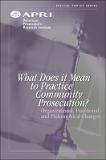| dc.description.abstract |
In the past 20 years, there have been dramatic changes in crime, public opinions of crime and the criminal justice system, and subsequently changes in how the criminal justice system operates. Operational changes in the justice system have focused on shifting from a reactive to a proactive approach. In many jurisdictions, prosecutors, like the police before them, have begun to make this shift away from the role of case processors to problem-solvers. Loosely defined, community prosecution is the new “buzz word” in prosecution. Yet for policymakers, academics, and others, community prosecution remains an amorphous concept. What are its defining characteristics, and what does it really mean to practice community prosecution? (palabras claves: persecución penal inteligente, investigación penal, ministerio público, comunidad) |

